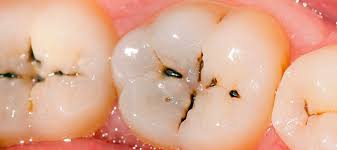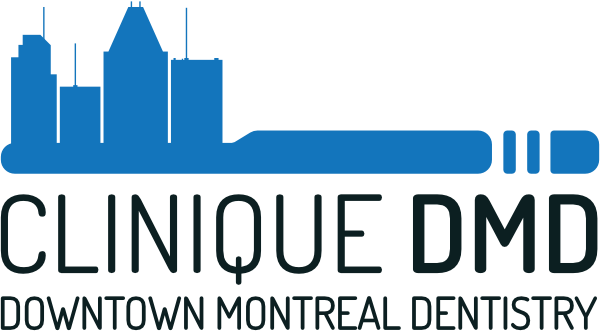Preventing cavities is one of the main reasons people visit the dentist. In this post, the team at Downtown Montreal Dentistry will present some basic facts about cavities, and what you can do to prevent them.
Cavities are not always holes
Many people think of a cavity as a hole in your tooth. It’s right there in the name – a cavity! But cavities, also known as caries, don’t have to be a hole. In fact, when they start they may simply be a decalcified area of your tooth that looks a little brown or yellow or even whiter than the surrounding enamel. It may not even be visible at all. If a cavity is allowed to grow large, it will start to undermine the dental enamel until some of it may break away, and then form a hole. Regardless, the best time to fix a cavity is when it is small, just before it starts to spread beneath the dental enamel.

An image of dental caries
Cavities don’t always hurt
Another common myth about cavities is that you will know when you have one because your tooth will hurt. While it is true that pain in a tooth can be a sign of a dental problem, often by the time you feel something, the cavity has already grown quite large. The outer layer of your tooth, the enamel, generally has no nerve feeling in it. A dentist could actually drill on your enamel without anesthesia and you wouldn’t feel it. The inner layer, the dentin, is the sensitive part. Once you start to feel the cavity, either as a sharp zing to getting something cold or sweet on it, or as a dull ache when you chew on it, you can be sure that it is at least into the dentin of your tooth. And if you feel a constant spontaneous throbbing in your tooth, the nerve might also be affected and the tooth may require a root canal. Not fun! That is why regular dental check ups are so important and treating problems when they are small saves time, pain and money in the long run.

Tooth decay formation step by step, forming dental plaque and finally caries and cavity
The causes of cavities are multifactorial
What this means is that different elements combine to put you are risk of getting cavities. These can include the obvious ones, like consuming excessive sugar, not brushing frequently enough with a fluoride containing toothpaste and not visiting the dentist often enough. But there are other elements as well, such as smoking or taking certain medications that make your mouth dry – saliva has a protective effect and the lack of it can lead to increased dental decay. Another one is frequent snacking between meals. Finally not flossing can also lead to cavities in between your teeth, areas where brushing alone doesn’t clean well.
Children don’t get more cavities than adults
Many people think that children get more cavities than adults, and this may have been the case in the past, but this trend has reversed over the last 20 years. It is now very common for us to see patients from childhood to early adulthood never get a single filling. With better hygiene, diets, parental vigilance and preventative care like dental sealants, kids are just less at risk for decay now. In fact, the majority of cavities seen today are in our seniors. Factors such as difficulty cleaning because of lack of manual dexterity, dry mouths due to physiological changes and medications, exposed roots of teeth which are are more prone to problems, and old fillings reaching the end of their useful life contribute to this phenomenon.
Prevention is key
The ways to prevent cavities is clear. A good brushing and flossing regimen at home, using a toothpaste that contains fluoride, will go a long way towards prevention. (to see a video on how to properly brush your teeth, click here) Discussing dry mouth with your dentist so a treatment plan can be developed to counteract it’s effects. Quitting smoking, which is simply good for your overall health in any case. Limiting snacking between meals. And visiting us at our dental office in downtown Montreal for regular professional cleanings and examinations, can help to catch problems while they are small, and prevent larger ones from developing. Your oral health is our collective responsibility.
To schedule an appointment at Downtown Montreal Dentistry, click on the contact us link.


